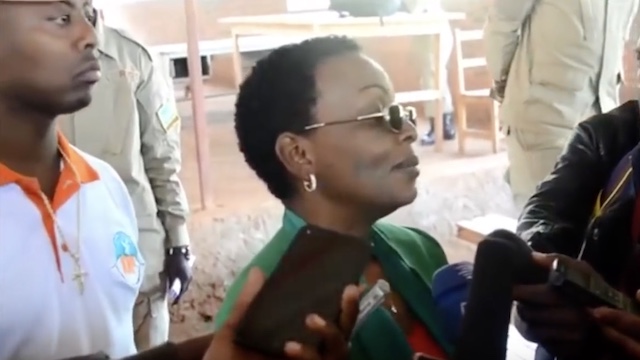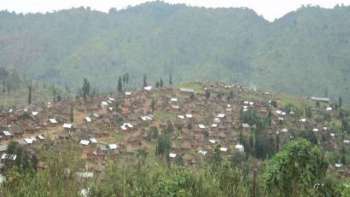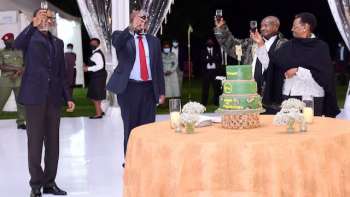On Saturday Sep 15, 2018, Rwandan opposition leader Victoire Ingabire, star musician Kizito Mihigo and more than 2000 prisoners were released early from jail. The release follows a decision by Rwandan dictator General Paul Kagame to commute sentence of or pardon some prisoners in a crowded Rwandan jail system. Most of the prisoners, including Victoire Ingabire and Kizito Mihigo had been thrown into jail for political reasons.
In January 2010, Victoire INgabire decided to return from a 16 years exile and run against the dictator of Rwanda, General Paul Kagame (see here).
She was barred from running in presidential elections, but also her political party was banned, her supporters and associates were persecuted, killed or jailed and her lawyer was thrown in jail. Most importantly, she ended up being arrested, accused of attempts to state security and divisionism. She endend up being sentenced to 15 years of jail. At her release, she had served 10 years, and the rest was commuted.
Ms. Victoire Umuhoza Ingabire has come to represent the face of the victims of the repressive regime of Rwanda. Her troubles epitomize the risks African opposition leaders and democrats who seek to promote democratic values and institutions in their countries run, and the courage some of them are willing to take to change the destiny of theircountries.The seemingly arbitrary detention and trumped up and preposterous charges against Ms Victoire Umuhoza Ingabire and ensuing condemnation and imprisonment have led most of the international community to view her as a political prisoner and has further isolated the current Rwandan government led by General Paul Kagame.
With a smile ans a sense of relief, Ms Ingabire thanked those who supported her during jail, especially her family and the members of her political organization. She also thanked the Rwandan dictator, insisting that she hopes her release means that the Rwandan government has found it can work with Rwandans of different political views and backgrounds. She declined to comment of her future political activities.
The other prominent prisoner is the Rwandan star musician Mihigo Kizito.Kizito Mihigo was, before his arrest and imprisonment, close to the regime of General Paul Kagame. He was arrested after he published a song with lyrics later viewed as going against the narrative around the 1994 Rwandan inter-ethnic massacres. In the song, Kizito Mihigo was inviting Rwandans to love each other and remember of the innocent people killed, whether they are Hutu or Tutsi.
After his arrest in April 2014, he admitted his guilt of plotting against General Paul Kagame and asked for forgiveness. However, his lawyers argued that the accusations against him lacked merit. He was condemned to 10 years on February 27, 2015. The sentence was reduced from 15 years, because he admitted the guilt and asked for forgiveness.
At his release Kizito Mihigo praised General Paul Kagame, the Rwandan government and said that prison has made him a better person and he will use the learnings to better his country and the citizens.
Given the praises of the Rwandan dictator General Paul Kagame, many wondered what is behind such sudden releases. Some have speculated that General Paul Kagame and his government seek to appease the International community at the time when the Rwandan Foreign Minister Louise Mushikiwabo is seeking to lead the Organisation internationale de la Francophonie. Others have pointed to other reasons, especially the critics about imprisoning women political leaders.
Among such women is Diane Rwigara. Critics say that Rwanda’s government, known for its widespread bloody repression, systematic killings and disappearances of political opposition leaders and critics, appears to be under pressure over Rwigara’s arrest and that the release of Ms Victore Ingabire may be a smokescreen meant to ease the pressure from Diane Rwigara's detention. Diane Rwigara tried to challenge General Paul Kagame in last year’s election but was disqualified over allegations that she forged some signatures on her nomination papers. She was later accused of and charged with inciting resistance and leading an insurrectional movement.
Anne Rwigara, Diane’s sister, speaking to the media, said Ingabire’s release should not be used as smokescreen to make people think that there is now free speech and rights for every Rwandan, in Rwanda. She told the AP that “The momentum to fight for rights for every citizen ... must continue.”Other observers went further pointing to the mounting international pressure to democratize the country, the prospects of civil war, and heightened conflicts with all neighboring countries, especially Burundi, Uganda, and the Democratic Republic of the Congo.

















